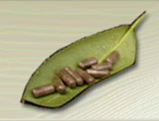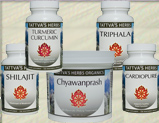 Loading... Please wait...
Loading... Please wait...Co2 Full Spectrum Holistic Herbs
Blog - holistic health
Incompatible Food Combinations (Virudha-ahar)
Posted by Dr. Vasant Lad , The Ayurvedic Institute , 1994 on 9th Dec 2009
Within the field of holistic health and nutrition there is a great deal of controversy about food combining. Even among the population at large there is growing concern about diet, and confusion over the large number of conflicting theories on the subject.
Ayurveda, an ancient holistic science of healing, offers a logical and scientific approach for determining correct diet based upon an individual’s constitution. Vata, pitta and kapha; the tri-dosha, are the elements which comprise individual constitution. This approach is quite different from the “traditional” view of a balanced diet; viz., eating daily from the basic food groups; meat, dairy, fruit, grains and vegetables. According to Ayurvedic literature, such a scheme is insufficient to lead us to the path of good health.
The nutritionist should give consideration to these types of agni when making suggestions concerning diet.
According to Ayurveda, every food has its own taste (rasa), a heating or cooling energy (virya) and post-digestive effect (vipak). When two or three different food substances of different taste, energy and post-digestive effect are combined together agni can become overloaded inhibiting the enzyme system and resulting in production of toxins in the system. While it is true that an individual’s agni largely determines how well or poorly food is digested, food combinations are also of great importance. When foods, (proteins, carbohydrates and fats) having different attributes, tastes, heating or cooling properties, and post-digestive effects are eaten together, agni will be slowed down. The foods can then remain in the stomach for seven to eight hours. These same foods, if eaten separately might well stimulate agni, be digested more quickly and even help to burn ama. Thus, according to Ayurveda, one should eat according to one’s constitution and take fruits, starches, proteins and fats separately at different times of the day. Combining foods improperly can produce indigestion, fermentation, putrefaction and gas formation. This condition, if prolonged, can lead to toxemia and disease complex. For example, eating bananas with milk can diminish agni, change the intestinal flora producing toxins and may cause sinus congestion, cold, cough and allergies.
Some basic concepts of an Ayurvedic Food Combining program include the following:
- Avoid taking milk or yogurt with sour or citrus fruits.
- Avoid eating fruits together with potatoes or other starchy foods. Fructose (and other sugars) is digested quickly, whereas starch takes quite some time. In this case the sugar would not be properly digested.
- Avoid eating melons and grains together. Melons digest quickly whereas grains take more time. This combination will upset the stomach. Melons should be eaten alone or left alone.
- Honey should never be cooked. Honey digests slowly when cooked and the molecules become a non-homogenized glue which adheres to mucous membranes and clogs subtle channels, producing toxins. Uncooked honey is nectar. Cooked honey is poison.
- Do not eat meat protein and milk protein together. Meat is heating and milk is cooling so they counteract one another, disturb agni and produce ama.
Milk and melons should not be eaten together. Both are cooling, but milk is laxative and melon is diuretic, and milk requires more time for digestion. Moreover the action of hydrochloric acid in the stomach causes the milk to curdle. For this reason Ayurveda advises against taking milk with sour fruits, yogurt, sour cream, cheese, and fish.
There is a beautiful passage in the Sanskrit literature describing all types of foods and their actions. Among the digestive aids referred to there are:
- Water, which imparts a liquid quality and helps in digestion and absorption of food.
- Salt also aids digestion, and helps to retain water.
- Alkalies help digestion and regulate gastric fire (HCL).
- Ghee stimulates agni and improves digestion.
- Milk invigorates.
- Meat gives energy. Also in this literature are descriptions on influence of foods on the tri-dosha:
- Pitta is increased by foods which are sour and pungent.
- Kapha is aggravated by milk products.
- Vata is over-stimulated by beans, dry fruits, astringent and bitter substances. The daily diet should contain:
- 40 – 50% well-cooked basmati rice, barley, corn or wheat depending upon one’s constitution.
- 15 – 30% well cooked legumes.
- 2 – 5% vegetable soups.
- 1/2 teaspoon pickles
In order to stimulate appetite one can chew and eat 1/2 teaspoon fresh grated ginger with a pinch of rock salt before each meal.
Ayurveda insists that iced water should not be drunk during or after a meal as it slows agni and digestion. Small sips of warm water taken during the meal serves to aid digestion. While eating one should properly masticate the food in order to soften it and ensure that it is thoroughly mixed with saliva. If desired, one can finish a meal by drinking a cup of lassi (or takram). This can be made by blending four teaspoons of yogurt with two pinches of ginger and cumin powder in one cup of water.
When eating, only one third of the capacity of the stomach should be filled with food, one third with liquid and one third should be left empty. This will aid in proper digestion and also promotes mental clarity.
INCOMPATIBLE FOOD COMBINATIONS
Milk Is Incompatible With:
- Bananas
- Fish
- Meat
- Melons
- Curd
- Sour Fruits
- Kitchari
- Bread containing yeast
- Cherries
Melons Are Incompatible With:
- Grains
- Starch
- Fried foods
- Cheese
Starches Are Incompatible With:
- Eggs
- Chai
- Milk
- Bananas
- Dates
- Persimmons
Honey Is Incompatible With:
- Ghee (in equal proportions)
Heating or cooking with.
Radishes Are Incompatible With:
- Milk
- Bananas
- Raisins
Nightshades, (Potato, Tomato, Eggplant, Chilies) Are Incompatible With:
- Yogurt
- Milk
- Melon
- Cucumber
Yogurt Is Incompatible With:
- Milk
- Sour Fruits
- Melons
- Hot drinks
- Meat
- Fish
- Mangos
- Starch
- Cheese
Eggs Are Incompatible With:
- Milk
- Meat
- Yogurt
- Melons
- Cheese
- Fish
- Bananas
Mangos Are Incompatible With:
- Yogurt
- Cheese
- Cucumbers
Corn Is Incompatible With:
- Dates
- Raisins
- Bananas
Lemon Is Incompatible With:
- Yogurt
- Milk
- Cucumbers
- Tomatoes
The above guidelines are by no means an exhaustive list. It must also be remembered that a proper Ayurvedic diet should consider nutritional value, constitution, seasons, age and any disease condition.















